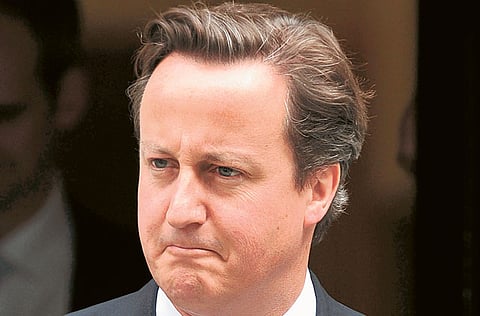Cameron needs to plan his moves
Scottish leader Salmond could teach British premier how to balance populism and good governance

There is one man in modern British politics who has pulled off something like the trick that too many Tories now worry will elude Prime Minister David Cameron.
He has approval ratings rivals would kill for, a reputation for being always one step ahead of his enemies, and a relentless focus qualities that, after the last week, Cameron might wish to observe at close quarters. Now he's about to get the chance, as the coalition opens talks with Alex Salmond over the forthcoming referendum on Scottish independence.
It shouldn't be hard in some ways for Conservatives to understand the nationalist wave Salmond has surfed so skilfully, on his journey from heading a minority Holyrood administration to governing in his own right the same sort of quantum leap Westminster Tories long to make in 2015.
After all, many Scots now seem to view London much as the Eurosceptic right sees Brussels: just another layer of smug, remote and rather stifling government with no real right to meddle. Conservatives, above all, surely understand the appeal of a bogeyman beyond one's borders on which to blame all one's troubles.
And so far, the coalition seems to be avoiding the obvious bear traps in handling this latest uprising. Rather disconcertingly for staunch Tory unionists, the tone is more humble than belligerent, carefully avoiding high-handedness. The Scottish secretary, Michael Moore, suggested at the weekend that while he doesn't want "devo max" — shorthand for transferring more trappings of statehood to Scotland without dissolving the union on the ballot paper — it's very much on the table, a hint that Scots could safely vote no and still go home with a consolation prize.
Cameron is expected to trudge north shortly for a meeting instead of summoning Salmond grandly to him. It's all about speaking softly, not carrying a big stick.
If the leadership style sounds familiar, that's because it's the one that arguably makes Cameron's own union with Nick Clegg possible: tolerant of dissent, fluid and flexible where a more conventional leader might be prickly and proud. But it's very different from the style that arguably got Salmond where he is today.
Charismatic leaders
While the two men share an undeniable charm and confidence, Salmond is a chess player, his every move planned in advance. Cameron seems happy on the hoof. And while Salmond may have only one big idea, he has pushed it undeniably successfully, inch by crafty inch: Cameron aims far higher and wider, but is now coming perilously close to doing none of it brilliantly well.
Cameron leads at a blistering pace and on a grand scale, driven always by Tony Blair's belief that Labour wasted too much time in office. So the coalition is not just tinkering with welfare, but unleashing the ‘big bang' of one single universal credit. It wants not just unprecedented efficiency savings from the NHS, but a structural revolution so big it's "visible from space" (in the words of its chief executive David Nicholson).
Not just slashing the deficit further and faster than Labour, but delivering super soaraway growth too — all while bringing regime change to Libya, navigating the possible collapse of the Eurozone and fitting in reform of the Lords in its spare time.
Slow and steady
Eighteen months ago, it felt a little churlish to criticise the coalition for thinking so big: the scale of its ambition at least was admirable, even if you didn't agree with it. Thinking small isn't much of a rallying cry either.
Yet it's not a bad way to govern: slow but steady, testing the theory first, stacking up the wins, keeping your eye always on the prize. The first rule of leadership, after all, is knowing what you are leading people towards, and that's where Tory backbenchers — now eyeing the prospect of a double-dip recession and the bedraggled remnants of the NHS bill — start having their doubts. Where, exactly, is Cameron heading with all this?
For a man whose ruthless streak is underestimated, Cameron as a leader lacks the firm smack of authority. He is overruled and contradicted curiously often from within his own party, rescued sometimes apparently from himself.
Internal dissent doesn't worry Cameron unduly: like Blair before him, he knows that picking a fight with his own party's fringes is an easy way of making himself look eminently reasonable. But it's not the hard right he's tangling with now.
The NHS bill has unnerved many centrist MPs worried less about the finer points of GP commissioning and more about not losing their seats.
So while Cameron has clearly thrown his full weight behind the bill (and for now, at least, behind Andrew Lansley) there remains a niggling doubt about what that guarantees, and for how long.
In an odd way, the rise of Scottish nationalism and the rebelliousness boiling up through ConservativeHome.com have something in common. They both reflect a new challenge for politicians, that of managing the relationship between elites and masses in a networked world where the latter have newly powerful platforms whether at Holyrood, or on a website designed to give a voice to activists once drowned out at Westminster.
Both were meant to ease the tensions between a powerful elite and a disgruntled mass: but both have instead created rival powerbases to be reckoned with. This is new and unpredictable territory, where leaders must tread a tricky line between looking fatally arrogant and fatally weak.
It's not at all clear that Cameron yet has that balance right.


